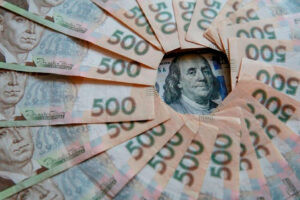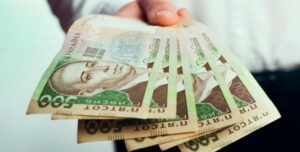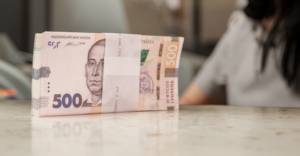
The 2.9% decline in hryvnia deposits in January after a 4.6% increase in December was seasonal and not related to the discussion of the draft law on mobilization, as evidenced by the 2.3% increase in hryvnia deposits in February, National Bank of Ukraine Governor Andriy Pyshny said.
“From year to year, customer account receipts increase at the end of the year and decrease at the beginning. This is a logical trend that was also present in peacetime. Businesses and the government try to complete all payments, including salaries, by the end of the year, and at the beginning of the next year, people spend or invest these funds,” Pyshnyi explained the seasonality effect.
According to him, the National Bank did not see any noticeable impact on the dynamics of deposits from the draft law on mobilization and “fake news” about the alleged introduction of taxation on all card transactions, which was refuted by the Ministry of Finance.
“Moreover, in the first weeks of its (the draft law on mobilization) discussion, the balances continued to increase. In addition, the relevant parliamentary committee has clearly stated that it will not support the provision on blocking accounts. This is possible, as it is now, only in court,” he emphasized.
Pyshnyi also clarified that the central bank did not make “any breakthrough innovations” regarding the disclosure of banking secrecy in February.
“We only clarified the terminology in accordance with the changes in the legislation on access to information, which the authorized state bodies had had before these changes in accordance with the established procedure. The NBU will continue to support initiatives aimed at combating the shadow sector, while strictly upholding the protection of the confidentiality of banking operations in accordance with international standards. we have only clarified the terminology,” the NBU governor said.
The NBU on its Facebook page followed the governor and reminded that in 2023, the amount of hryvnia funds held by households in banks increased by UAH 121 billion, or 20.5%, and reached a historic high of UAH 711 billion, and as of early March, households kept about UAH 707 billion in hryvnia accounts in banks.
“These indicators demonstrate confidence in banks and the national currency, and the share of time deposits of individuals in hryvnia increased by 4.2 percentage points over the year. Despite the widespread war, the level of dollarization of household deposits decreased by more than 2 percentage points to about 34%,” the regulator said.

The average rate of new hryvnia deposits for the corporate sector decreased by 0.9 pp (percentage points) for the second month in a row to 12.5% in September, while for households it remained at around 12.25% per annum after the first decline of 0.5 pp in August for 14 months.
According to the NBU on its website, the yield on foreign currency deposits for individuals also remained unchanged in September at around 1.15% p.a., while the yield on corporate deposits decreased by an average of 0.15 percentage points to 0.58% p.a.
Interbank lending rates, as indicated by the National Bank, fell by 1 percentage point to 17.2% per annum in September, including overnight rates by 0.3 percentage points to 16.4% per annum.
As for the volume of deposits, the gap between corporate and retail deposits continued to narrow in September: while corporate deposits decreased by UAH 12.1 billion, or 1.1%, to UAH 1 trillion 116.3 billion, retail deposits increased by UAH 22.9 billion, or 2.4%, to UAH 999.4 billion.
Households increased their deposits both in hryvnia by 2.5% to UAH 663.7 billion and in foreign currency by 2% to the equivalent of UAH 335.7 billion, while in September, corporate deposits in foreign currency decreased by 5.4% to UAH 340.2 billion, while in hryvnia they increased by 0.8% to UAH 776.1 billion.
The total loan portfolio, which returned to slow growth in July, added another UAH 4.9 billion in September to reach UAH 975.0 billion.
The growth was driven by hryvnia loans to the corporate sector, which increased by 1.9% to UAH 509.6 billion, while foreign currency loans decreased by 1.4% to the equivalent of UAH 230.8 billion.
In September, consumer loans decreased both in national currency by 0.3% to UAH 202.4 billion and in foreign currency by 0.4% to the equivalent of UAH 12.5 billion.
As reported, on September 15, the NBU cut the discount rate from 22% to 20% per annum, while reducing the rate on three-month deposit certificates from 22% to 20%, while the rate on overnight deposit certificates decreased from 18% to 16%.
Inflation in Ukraine in annual terms slowed to 7.1% in September from 8.6% in August and 11.3% in July.
In order to increase investment in the development of deposits in Ukraine, it is necessary to remove the classification for official use (DSP) from geological data on critical minerals, according to participants of a special industry conference of the European Business Association (EBA) Mining Day (Mining Day), held in Kiev on Friday.
Denis Alyoshin, Director of Strategic Development at Ukrlicitydobycha, noted that access to information can be a very simple and effective incentive for investment. And now it is possible to get information other than that which has the CPD grip.
“But why now we still have information with the CPD grip? What exactly do we not want to show? When I communicate with international investors, on my project I cannot show the critical information that is needed to evaluate my project. For two or three years we have been sending letters to the Prime Minister or relevant ministries, etc. Everyone supports it, no one understands why we need a CPD,” questions Aleshin.
In his opinion, this is a very simple and very effective step, which will immediately open the door, at least for many investment intentions, “even if not investments, but intentions”. Currently, this is a very painful issue for the industry, the manager emphasized.
Referring to the activities of Ukrlitia, he reported on the implementation of the project for the development of Polokhovskoye lithium deposit (Kirovograd region), the resource base of which is 75 million tons of lithium-bearing ore. The company intends to produce concentrate from it and then lithium hydroxide/carbonate.
“The strategy is to work with Europe, as there is not enough lithium there. Lithium is used in the production of lithium batteries. The plans are to recycle, build a plant. We plan to prepare a study according to EBRD standards to attract financing,” the strategic development director said, adding that one of the biggest problems at the moment is qualified personnel.
In turn, deputy director for investments of the investment company umgi Mykola Shevchenko noted that Ukraine has a number of advantages for attracting investments in subsoil development: “what we have and what we can offer investors”.
“In particular, the vast majority of information in Ukraine is available on various minerals. But there is also CPD on critical minerals. And we support the opening of this information for all investors”, – emphasized Shevchenko, adding that now it is impossible to make a strategic decision on the extraction of certain minerals.
At the same time, the manager named among the advantages of Ukraine – availability of land: in Ukraine there is a mechanism of compulsory purchase of land for system needs, while in a number of countries there is no such thing.
“There is transparency of auctions. There is availability of geological information and detailed exploration of territories, but more openness is needed. Among the economic factors, in particular, the low cost of land ($3 thousand, and for example in Poland – $40 thousand) and the low cost of labor ($600),” – stated the deputy director.
In his opinion, to attract investors it is necessary to guarantee military risks, guaranteed withdrawal of dividends, fiscal incentives: tax vacations, preferential long-term lending, decentralization of taxes, so that part of the tax remained locally. Also speeding up and simplifying the change of land designation, greater openness of all geological information.
“We have invested in most of the projects in Ukraine – in mining, and less in processing, as there are certain chemical processes required, there are difficulties in obtaining permits from environmental authorities,” explained the manager.
Andriy Gorokhov, CEO of umgi, added that there is currently no operating critical materials player in Ukraine that is successful: this means that we are not doing something enough as a society.
“Companies have now taken considerable risks and are investing in critical industry projects. They are doing it themselves thanks to equity capital. With no help from the government. They are doing well and are heroes because they are taking big risks. No strategy from the government, no support. It takes a lot of effort, and it is very difficult to cope with the problems alone,” the top manager emphasized, noting that projects in this area are estimated from $300 million to several billion dollars “to build both production and process.”
Therefore, it is difficult for investors to make decisions taking into account the current situation and low returns on funds invested in the projects.

Ukrainian military in six months opened in the state-owned PrivatBank (Kiev) special deposits “Glory to heroes” for 2 billion UAH, and in Oschadbank deposits “My defender” – for 12.9 billion UAH, according to press services of the banks.
According to the head of Oshchadbank Sergei Naumov, since the beginning of the year the amount of deposits on special deposits increased by 30%.
Oschadbank offers increased interest rates on this deposit in the amount of 13% per annum (for deposits for a period of three months) and 14% per annum (for a period of six months).
Monthly payment of interest, replenishment, rollover and changing the date of deposit return before the end of the contract without loss of accrued interest is provided on the deposit. The minimum deposit amount is 5000 UAH.
Except for servicemen, volunteers of Armed Forces of Ukraine and Territorial Defense members of their families (spouse, husband, parents or children) can open a deposit in the branches of Oschadbank on presentation of supporting documents.
The deposit “Glory to Heroes” from PrivatBank gives the opportunity to get 14% per annum for servicemen, who receive target payments from the state through PrivatBank.

The average rate of new hryvnia deposits for households in December was 10.6% per annum, which is by 0.6 percentage points (p.p.) higher than in November and by 4.9 p.p. than in May, when the historical minimum was reached.
According to the information from the National Bank of Ukraine (NBU) on its website, the rate on deposits in the national currency increased by 3.5 p.p. over 2022.
At the same time, the rate on loans in hryvnia to households in December remained at the level of November – 35.1% per annum, and for the year its growth was only 1.4 percentage points.
The rate on foreign currency deposits, which reached a historical low of 0.4% per annum in April, decreased from 0.7% to 0.6% in December, which may be associated with deposits for the purchase of foreign currency, the rate on which, as a rule, is close to zero.
As for the corporate sector, the rate on new hryvnia deposits in December increased by 0.8 p.p. – to 10.4%, while on foreign currency deposits it decreased by 0.1 p.p. – to 1.4% per annum.
The average rate of UAH loans to the corporate sector in December decreased by 0.7 p.p. – to 20.1%, whereas on foreign currency loans – by 0.2 p.p., to 5.2%.
During the year, hryvnia loans for corporate sector went up by 11 p.p., while currency loans went up by 1.1 p.p.
As earlier reported, on June 3, the NBU raised its key rate from 10% to 25%, in order to improve the attractiveness of the hryvnia, reduce pressure on international reserves and combat inflation, which totaled 26.6% for the year.
The National Bank expects that banks will also increase rates on deposits, and the Ministry of Finance – on OVGZ, while the increase in interest rates on loans will not be so significant. Since October, the Ministry of Finance raised rates on bonds with maturities of five to 24 months to 14-19.5% per annum, while in the secondary market they reach 20% per annum and higher.

President of Ukraine Volodymyr Zelensky said that he instructed the National Bank, deputies and officials to find an opportunity to guarantee 100% of deposits of Ukrainians in banks.
“This is a special task for the National Bank of Ukraine, for people’s deputies and our officials. I instructed to find such a legislative opportunity that the state would guarantee 100% of deposits in banks. 100%. Not part, as it is now, as usual, but in full. The entire deposit. In any bank of our state. So that people do not lose money and are not afraid of it under any circumstances. So I am waiting for specifics. A draft decision. And I hope that the Verkhovna Rada will not be slow in providing support. Because Ukrainians need it. Ukraine needs it,” he said in a video message on the night of Thursday.
In addition, according to him, “the Cabinet of Ministers will vote tomorrow for a large-scale reduction in regulations.”
“There were more than 600 permits and licenses for business, and about 20 remain mandatory. Only those that simply cannot be cancelled. Like, for example, the management of radioactive waste,” Zelensky said.
According to him, the government has already prepared a decision to expand the lending program for entrepreneurs on the basis of the Affordable Loans 5-7-9% program.
“Any business will be able to get a loan at 0% during martial law plus one month after the war. Then there will be a minimum rate of 5%. And the total amount of the loan can be up to UAH 60 million. To widen the circle of those businesses that can use our program “, the president said.